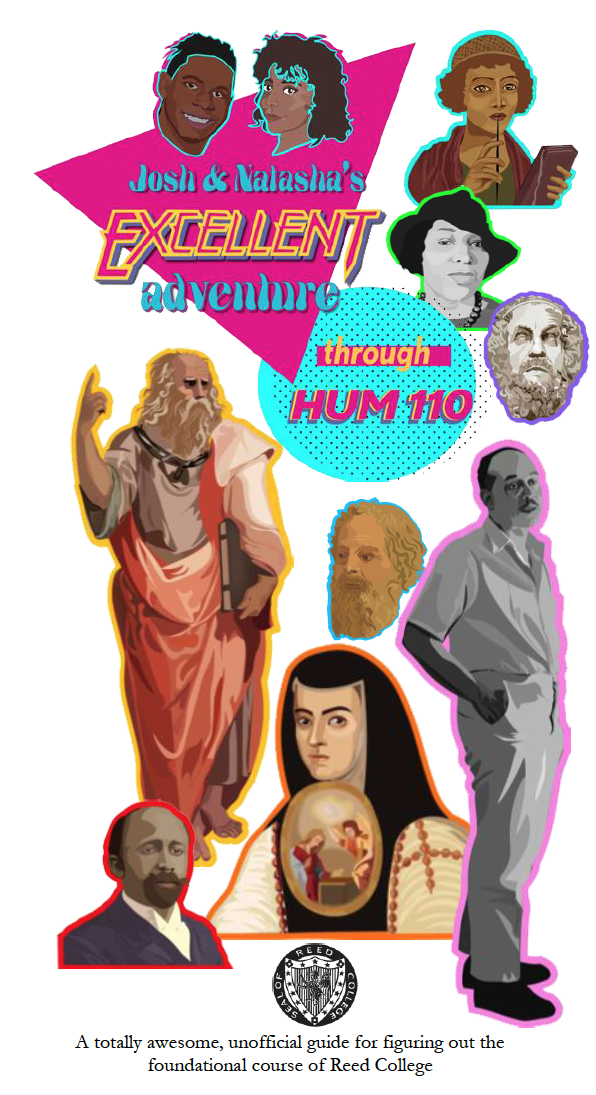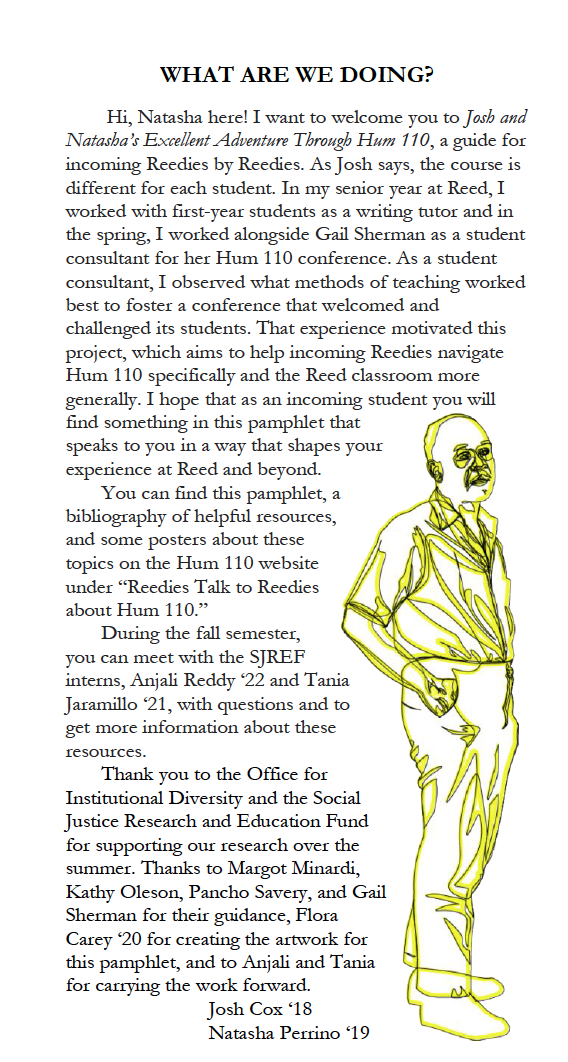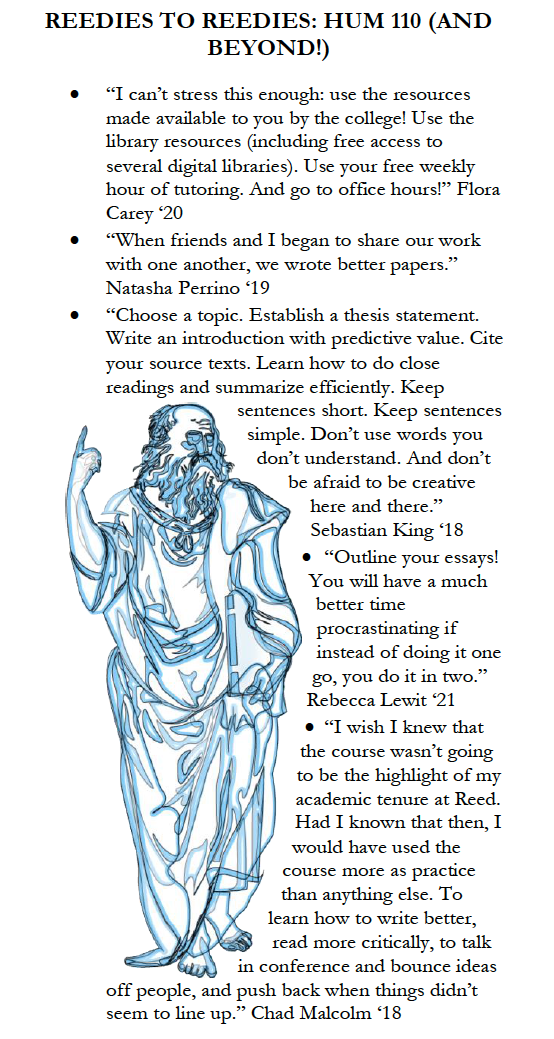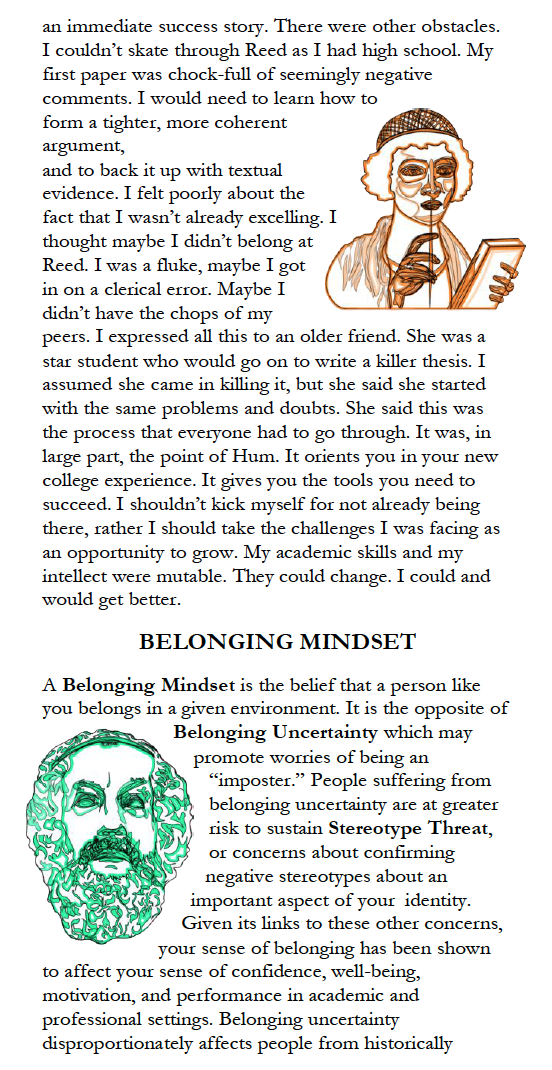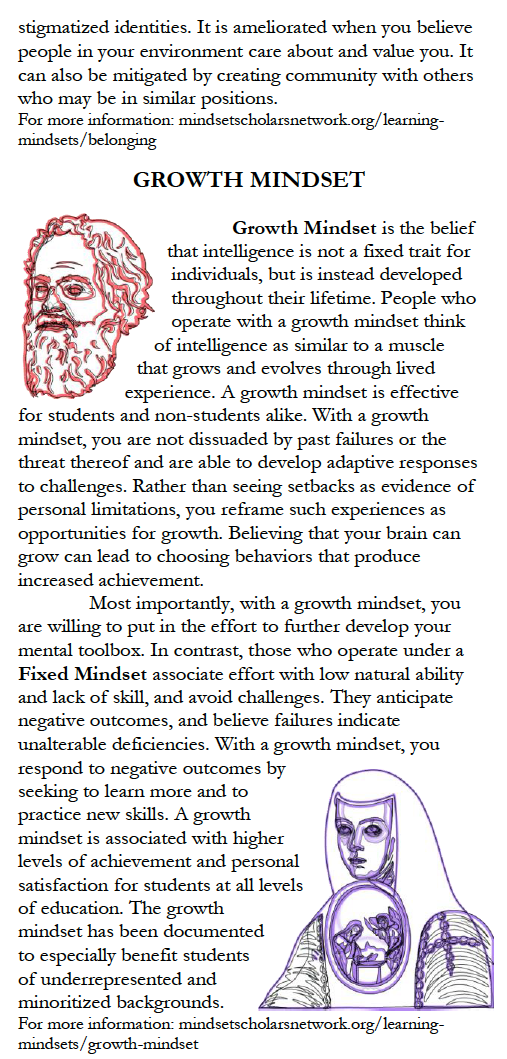Reedies to Reedies in Hum 110
- Selective Annotated Bibliography for Students on Stereotype Threat and Student Success
- Josh and Natasha's Excellent Adventure Through Hum 110
Selective Annotated Bibliography for Students on Stereotype Threat and Student Success
Steele, Claude M. Whistling Vivaldi: How stereotypes affect us and what we can do. Norton, 2010. Names the numerous obstacles minoritized students encounter throughout their education, and offers effective responses.
Colón García, Ana. "Building a Sense of Belonging through Pedagogical Partnership," Teaching and Learning Together in Higher Education: Iss. 22 (2017). This article gives a first-person account, modeling how a student’s sense of belonging in the classroom increased over her years in college.
Dweck, Carol. Mindset: The New Psychology of Success. Random House, 2006. The most recent book by the researcher who formulated Mindset theory. See her website for useful resources < https://mindsetonline.com/>
The Project for Education Research That Scales (PERTS). The Mindset Kit. https://www.mindsetkit.org/
Offers resources on practices to support student learning based on research in the psychology department at Stanford University. Aimed at faculty, but useful for students as well.
Walton, Cohen & Steele. StrategiesToReduceStereotypeThreat - List of classroom and workplace strategies, with additional bibliography and links.
Oluo, Ijeoma. So You Want to Talk About Race. Seal Press, 2018. - Offers constructive tips for white and POC readers on using knowledge gained from this book to support others to challenge preconceptions about race.
DiAngelo, Robin. What Does It Mean to Be White?: Developing White Racial Literacy (Revised Edition). Peter Lang, 2016. Clear, powerful discussion of the words, assumptions, narratives, and silences that support racism in educational institutions and beyond, and how to counter them.
DiAngelo, Robin. White Fragility: Why It’s So Hard for White People to Talk About Racism. Beacon Press, 2018. A more closely-focused version of the earlier book by the same author, showing how changing assumptions can interrupt racism (pp. 142-143); addressed to both people of color and white people.
Rattan, Aneeta et al. “Leveraging Mindsets to Promote Academic Achievement: Policy Recommendations.” Perspectives on Psychological Science 2015, Vol. 10(6) 721–726. - This essay offers multi-faceted suggestions for how to mitigate the race, gender, and social class gaps in academia.
Bernard, D. & Neblett, E. Adolescent Res Rev (2018) 3: 279. A Culturally Informed Model of the Development of the Impostor Phenomenon Among African American Youth. Helpful to students of color in that it exposes the obstacles they will have to surmount to address imposter syndrome. Helpful to professors in that it elucidates why typical validation techniques may not work with students of colors in the same way they do with white students.
Kumar, Shamala & M. Jagacinski, Carolyn. Imposters have goals too: The imposter phenomenon and its relationship to achievement goal theory. Personality and Individual Differences. (2006). - More useful for faculty than students. Reports results of a study that revealed gender differences in imposter syndrome among students. Women’s imposter fear: greater than men’s, linked to entity theories of intelligence, cannot be reduced by adopting task goals; men’s imposter fears: driven by fear of failure, can be buffered by adopting task goals.
Williams, Kimberlé Crenshaw. “Race, Reform, and Retrenchment: Transformation and Legitimation in Anti-discrimination Law” in Critical Race Theory: The Key Writings that Formed the Movement. Edited by Kimberlé Crenshaw, Neil Gotanda, Gary Peller and Kendall Thomas. The New Press, 1995, pages 103-122.
Davis, Angela. Women, Race, and Class. New York, 1981.
An influential study of feminist movements and their relation to racism and classism, from the abolitionists to the second wave feminists of the 1960s. Still relevant today.
Ahmed, Sara. Living a Feminist Life. Durham, N.C., 2017. Philosophical analysis of, and pragmatic advice on, feminism and diversity work in academia. Ahmed’s “killjoy manifesto” outlines problems that feminist theory reveals and feminist practice addresses.
Thanks to Josh Cox, Reed ‘18 and Natasha Perrino, Reed ’19 for this annotated list, and to the Social Justice Research and Education Fund of the Office for Inclusive Community for support in creating it.
Josh and Natasha's Excellent Adventure Through Hum 110
Click here for a pdf of this pamphlet.
